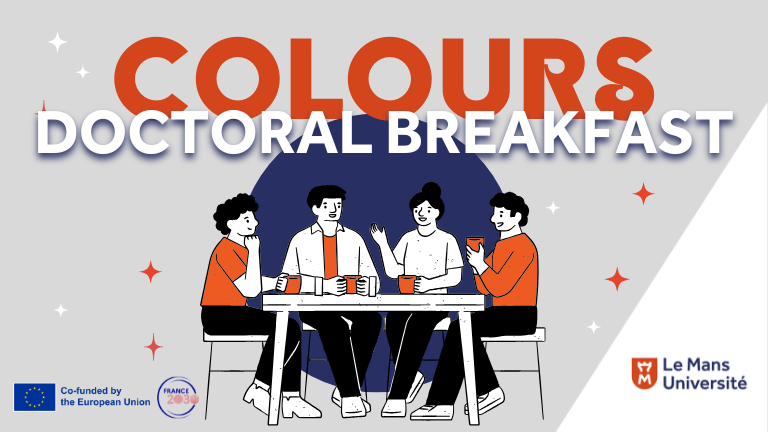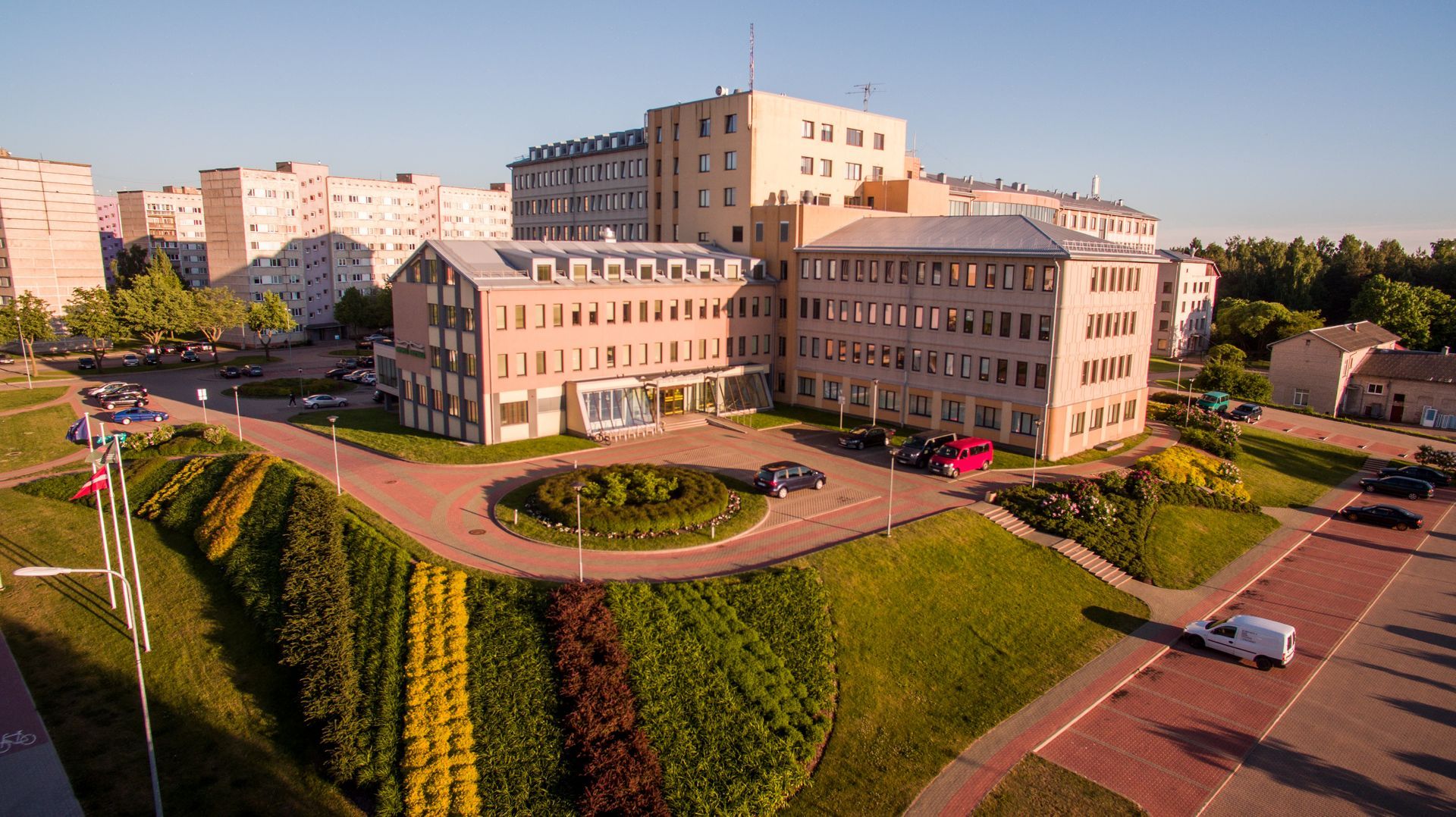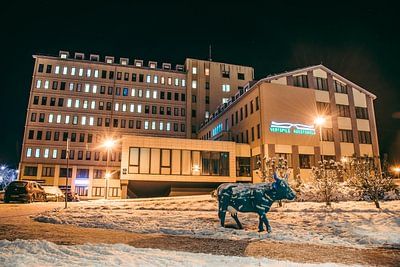Student Liena Kaģe Participates in Multilingualism EU Summer School in Luxembourg
From July 1 to 6, Luxembourg hosted the first Multilingualism EU Summer School, organized by several European Union institutions for master's students from universities participating in the European Master in Translation (EMT) network. The Ventspils University of Applied Sciences Master's program in Translation is also part of the EMT network, and our university was represented at the summer school by Liena Kaģe, a student in this program. Liena shares her impressions of the summer school, which was attended by 32 students from 24 countries.
Luxembourg is a small country in the heart of Europe. It has a population of 672,050, of which just over half are Luxembourgish, with the rest comprising 169 other nationalities. The official languages – Luxembourgish, French, and German – are heard alongside many other languages spoken by the people of multicultural Luxembourg.
The location of the summer school was not chosen at random – it was in Luxembourg that the European Coal and Steel Community was founded in the early 1950s, which later became the European Union as we know it today. Today, Luxembourg is home to several European Union institutions, and we, the summer school participants, visited most of them.
Day 1: Secretariat-General of the European Parliament
The summer school was opened in the Parliament building, where we were introduced to the week's program and got to know each other. I was pleasantly surprised by the students' erudition and language skills – knowledge of four, five or more languages was not the exception, but the norm. I met young people who were fluent in six languages and could switch from one language to another without difficulty during a conversation. Most of the students specialized in written translation, three students specialized in interpreting, and a few others represented the field of law.
After getting acquainted, we were divided into groups: some students attended a master class on subtitling and dubbing, while others worked in the Europarl radio workshop. In the afternoon, each student had the opportunity to meet with a translator from the European Parliament's translation departments who worked in their language to discuss the translation of a previously assigned text and learn about the specifics of the work of Parliament translators. At the end of the busy day, we visited the newly created museum about the European Union.
Day 2: Court of Justice of the European Union
The Court of Justice of the European Union is the largest court in Europe. Its multilingualism makes it unique in the world, as proceedings can be conducted in any of the official languages of the EU. The Court is in several buildings, four of which are towers. All the buildings are interconnected, and it took almost 10 minutes to walk from one end of the Court to the other.
Summer school students had the opportunity to attend a court hearing and listen to the debates. Before the hearing, we were given a short presentation on the case. The court proceedings were interpreted into several languages, including Latvian. I was proud to hear the high-quality performance of the Latvian interpreter and to see Latvian judge Ineta Ziemele at work!
In the afternoon, we were again divided into groups – the future interpreters had the opportunity to meet with the Court interpreters, while we, the translators, had a presentation on how the principle of multilingualism works in practice. After that, we went on a tour of the Court.
The organizers had not only arranged comfortable accommodation in a hotel, but also ensured that we could socialize every evening, enjoying dinner together in one of Luxembourg's restaurants.
Day 3: European Court of Auditors and Translation Centre of the European Union Institutions (CdT)
On the third day, we visited the Court of Auditors. It was interesting to learn that this institution has very small teams of translators – only four translators for each language (except for French, which has eight translators, and English, which has ten). After listening to a valuable presentation by the English language department on plain language and asking questions, we were divided into language groups to do some practical work with one of the Court's translators – translating a press release using the principles of plain language.
Practical work in groups: Latvian students together with translator Inga Stodere, who shared her experience of working at the Court of Auditors.
In the second part of the day, we listened to a presentation by the Translation Centre on the IATE terminology database, saw its " background" and learned about the steps taken with a term before it becomes available in the database.
After an informative day, we went on a guided tour of Luxembourg city, where we saw the ancient old town of Grund and the architecture of the city centre, which blends artistically into the picturesque landscape.
Day 4: European Commission and Publications Office of the European Union
At the European Commission, we were treated to interesting presentations about working at the Commission, the possibilities of artificial intelligence in translation, and working with large language models. Here I gained an important insight into the fact that, as the translation profession changes, it is increasingly necessary to have not only good language skills, but also strong IT skills.
After the question and answer session, we had the opportunity to meet with translators of our own language. Latvian students had the opportunity to talk to translator Jānis Līmežs, who also studied and worked at Ventspils University College. Jānis talked about his work at the Commission and his life in Luxembourg, as well as sharing his experience of various practical aspects of translation work.
We spent the second half of the day in another building – the Publications Office of the European Union. Time flew by here – after presentations on the Office's activities, we went to see the archive, where all printed publications since the beginning of the European Union are stored. Not only the Official Journals are collected here, but also all brochures, posters, and other printed materials published by EU institutions. I found the part of the archive containing the legislation that each country had to translate upon joining the European Union particularly interesting. The legal acts binding on Latvia are arranged on four shelves. Standing there, I had a special feeling, because I could touch documents that have directly influenced my life.
At the end of the day, we met with editors from the Publications Office, discussed the specifics of their work, and carried out a practical task in groups – we edited a text intended for publication. When that was done, we listened to valuable information about job opportunities in EU institutions and the EPSO selection procedure.
Day 5: European Investment Bank
On the last day of the working week, we visited the European Investment Bank. Upon arriving at the meeting room, we felt privileged, as high-ranking officials gather here for meetings. We listened to interesting presentations about the EIB and the work of the translation department, and we also learned about how skilfully multilingualism is integrated into the Luxembourg education system.
Day 6: end of summer school
On Saturday morning, we went on a short excursion to Mullerthal, a place known as Luxembourg's little Switzerland. After an intensive week of studying, this short excursion was just what we needed. As we climbed the steep, rocky trails and enjoyed the beauty of unspoiled nature, we looked back with satisfaction on the week we had experienced. Lots of new information and impressions, new friends, and life in a multicultural environment – it was an invaluable experience that I wish every student could have!
Some recommendations if you want to pursue a career in EU institutions
Learn foreign languages actively! Young Europeans start out in the job market from a strong position, as they not only speak several foreign languages, but often have also mastered another specialty. This makes them much more competitive in the international environment.
Learn French! All the institutions we visited emphasized the importance of French as a working language; this was particularly emphasized at the Court of Justice of the European Union, where knowledge of French is essential.
Get involved in international student life by taking advantage of the study and internship programs offered by the EU! This is a great opportunity not only to travel, broaden your horizons, and learn languages, but also a practical way to get to know the profession of interpreter/translator.
Thank you to Ventspils University of Applied Sciences for the opportunity to participate in the summer school and represent the university!
Thank you to the organizers of the Multilingualism EU Summer School for this wonderful experience!
Applications for the master's program in "Translation and Terminology " are open from July 16 to 22.
Share on other platforms
Other news







